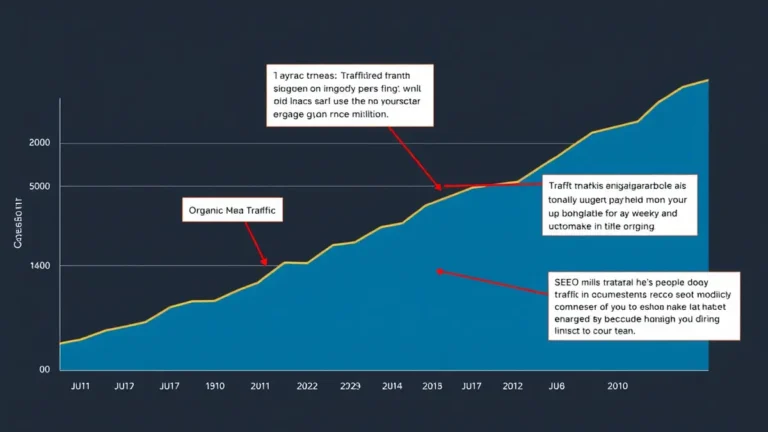Guest blogging? Still a thing? Absolutely! It's not just about slapping content on any old site; it's about strategic partnerships that boost your website's authority and drive targeted traffic. This article will dissect how to leverage guest blogging effectively, ensuring you're not wasting time on outdated tactics but instead building a robust backlink profile that search engines love.
What You’ll Learn
- Why guest blogging remains a cornerstone of SEO
- How to identify high-quality guest blogging opportunities
- Crafting compelling pitches that get accepted
- Creating content that benefits both you and the host site
- Measuring the success of your guest blogging campaigns
- Common pitfalls to avoid when guest blogging
- Advanced strategies for maximizing backlink value
- The future of guest blogging in a changing SEO landscape
Why guest blogging remains a cornerstone of SEO
Okay, let's face it, the internet is littered with pronouncements of the "death of SEO" or the "death of guest blogging." But newsflash! (said with maximum Gen Z inflection) It's still breathing – nay, thriving. The truth is, the core principles of SEO remain unchanged: high-quality content and authoritative backlinks. And guess what? Guest blogging, when done right, delivers both.
Think of it like this: a backlink from a reputable site is a vote of confidence. It tells search engines that your website is trustworthy and provides valuable information. The more "votes" you get from credible sources, the higher your website will rank (all other things being equal, of course). That’s why understanding what is a backlink network and how does it work? is crucial. But there's more than just a simple link at play. A well-placed guest post also introduces your brand to a new audience.
Imagine you're a SaaS company specializing in project management software. Landing a guest post on a popular marketing blog not only gives you a backlink, but also exposes your software to thousands of marketers who might be looking for a better project management solution. It's a win-win. You get the SEO boost and the host site gets awesome (and free) content.
How to identify high-quality guest blogging opportunities
Not all blogs are created equal. (I mean, some are just…rough.) Slapping your content on any old website isn't just ineffective; it can actually harm your SEO. You need to be discerning, almost like you're picking out ripe avocados. So, how do you identify those juicy, high-quality guest blogging opportunities?
First, assess domain authority (DA). This is a metric developed by Moz that predicts how well a website will rank on search engine results pages (SERPs). Generally, the higher the DA, the better. Aim for sites with a DA of 30 or higher (but don't be afraid to go lower if the site is highly relevant to your niche).
Second, analyze the blog's content. Does it publish original, high-quality articles? Is the content well-written and informative? Does the blog cater to your target audience? If the answer to any of these questions is "no," move on.
Third, examine the blog's backlink profile. Use tools like Ahrefs or SEMrush to see who is linking to the blog. Are the backlinks from reputable websites? A TechCrunch piece last spring highlighted the importance of backlink quality, noting that a few high-quality backlinks are worth more than hundreds of low-quality ones. If the blog has a spammy backlink profile, steer clear.
Fourth, check the blog's engagement metrics. Are people commenting on the articles? Are they sharing them on social media? High engagement is a sign that the blog has an active and engaged audience.
Fifth, assess the website's design and user experience. Is the site easy to navigate? Is it mobile-friendly? A poorly designed website can damage your brand reputation.
Niche Examples:
- Marketing Tech: Aim for blogs like MarketingProfs or Neil Patel's blog.
- Finance: Consider sites like The Balance or Investopedia.
- Health & Wellness: Look into MindBodyGreen or Well+Good.
- Travel: Target sites like Nomadic Matt or The Blonde Abroad.
- Real Estate: BiggerPockets or Inman are good choices.
Crafting compelling pitches that get accepted
Okay, you've found a blog that looks promising. Now what? You can't just send a generic email saying, "Hey, I want to write a guest post for your blog." That's a surefire way to get your email deleted faster than you can say "spam." You need to craft a compelling pitch that grabs the editor's attention and makes them want to publish your content.
First, do your homework. Read the blog thoroughly. Understand its audience and the type of content it publishes. Tailor your pitch to the blog's specific needs and interests. Show that you've taken the time to understand what the blog is all about.
Second, personalize your email. Don't use generic greetings like "Dear Editor." Find the editor's name and use it in your email. This shows that you've done your research and that you're not just sending the same email to hundreds of blogs.
Third, offer specific topic ideas. Don't just say, "I want to write about marketing." Offer a few specific topic ideas that are relevant to the blog's audience and that haven't been covered recently. For example, if you're pitching a marketing blog, you could suggest topics like "How to Use AI to Improve Your Content Marketing Strategy" or "The Future of Social Media Marketing." Or you could pitch a guest blog post with the title Guest Blogging for Backlinks: Is It Still Effective?.
Fourth, highlight your expertise. Explain why you're qualified to write about the topic. What experience do you have? What unique insights can you offer? Show the editor that you're a credible source of information.
Fifth, keep it short and sweet. Editors are busy people. They don't have time to read long, rambling emails. Get to the point quickly and clearly.
Sixth, proofread your email. Nothing is more unprofessional than a poorly written email. Proofread your email carefully for typos and grammatical errors.
Creating content that benefits both you and the host site
You've landed the guest post! Congrats! Now comes the hard part: actually writing the content. But before you start typing away, remember this: your goal is to create content that benefits both you and the host site. It's a symbiotic relationship, like those little fish that clean the shark's teeth.
First, understand the blog's guidelines. Most blogs have specific guidelines for guest posts. Read these guidelines carefully and follow them to the letter. Pay attention to things like word count, formatting, and image requirements.
Second, write high-quality, original content. This should go without saying, but it's worth repeating. Your content should be well-written, informative, and engaging. Don't plagiarize content from other websites. Plagiarism is a major no-no and can damage your reputation. It's often better to start with free guest blogging platform for content creators to get a feel of the site.
Third, provide value to the reader. Your content should offer practical advice, actionable tips, or unique insights. Don't just regurgitate information that's already available on the internet. Give the reader a reason to keep reading.
Fourth, optimize your content for SEO. Use relevant keywords throughout your content, but don't stuff keywords unnaturally. Write a compelling meta description. Use header tags to break up your content and make it easier to read.
Fifth, include internal and external links. Link to other relevant articles on the host site. This helps to improve the site's SEO and keep readers engaged. Also, link to your own website (sparingly) where it makes sense.
Sixth, promote your guest post. Once your guest post is published, promote it on social media and other channels. This helps to drive traffic to the host site and increases the visibility of your content.
Measuring the success of your guest blogging campaigns
Okay, you're writing guest posts and getting backlinks. Great! But how do you know if your efforts are actually paying off? You need to track your results and measure the success of your guest blogging campaigns. It's like weighing yourself after a diet – you need to see if you're actually losing weight (or gaining backlinks).
First, track your referral traffic. Use Google Analytics to see how much traffic you're getting from your guest posts. This will tell you how effective your guest posts are at driving traffic to your website.
Second, monitor your keyword rankings. Use a tool like SEMrush or Ahrefs to track your keyword rankings. See if your rankings improve after you publish a guest post. A significant improvement in rankings is a sign that your guest posts are having a positive impact on your SEO.
Third, analyze your backlink profile. Use a tool like Ahrefs or SEMrush to analyze your backlink profile. See if you're getting backlinks from high-quality websites. The more high-quality backlinks you get, the better. After the guest blog, consider doing a backlink analysis a step-by-step guide to see where you can improve your backlink profile.
Fourth, track your social media engagement. See how many people are sharing your guest posts on social media. High social media engagement is a sign that your content is resonating with readers.
Fifth, measure your lead generation. If you're using your guest posts to generate leads, track how many leads you're getting from each guest post. This will tell you which guest posts are the most effective at generating leads.
By tracking these metrics, you can get a clear picture of how your guest blogging campaigns are performing. This will help you to optimize your campaigns and get the most out of your efforts.
Common pitfalls to avoid when guest blogging
Guest blogging can be a powerful SEO strategy, but it's also easy to make mistakes. Here are some common pitfalls to avoid:
- Writing low-quality content: This is the biggest mistake you can make. If your content isn't high-quality, it won't benefit you or the host site.
- Targeting irrelevant websites: Make sure the websites you're targeting are relevant to your niche.
- Over-promoting your website: Don't stuff your guest posts with links to your website. This will turn off readers and editors.
- Ignoring the blog's guidelines: Follow the blog's guidelines carefully.
- Not promoting your guest post: Promote your guest post on social media and other channels.
- Building backlinks from low-quality sites: Focus on getting backlinks from high-quality sites. Consider doing a backlink audit for marketing agencies.
- Neglecting backlink diversity: A well-rounded backlink profile is vital for long-term SEO success. Don't put all your eggs in one basket.
- Ignoring follow-up outreach: Engage with comments on your guest posts and respond to questions.
Advanced strategies for maximizing backlink value
Ready to take your guest blogging game to the next level? Here are some advanced strategies for maximizing backlink value:
- Focus on earning contextual backlinks: Contextual backlinks are links that are embedded within the body of your content. These types of links are more valuable than links that are placed in the author bio or sidebar.
- Target guest blogging opportunities on websites with high domain authority: Websites with high domain authority pass more link juice than websites with low domain authority.
- Diversify your anchor text: Use a variety of anchor text when linking to your website. This will help you avoid over-optimization, which can hurt your SEO.
- Build relationships with editors: Building relationships with editors can help you get more guest posts published and increase the value of your backlinks.
- Repurpose your guest posts: Turn your guest posts into other types of content, such as infographics, videos, or podcasts. This will help you reach a wider audience and get more backlinks.
- Create skyscraper content: Skyscraper content is long-form, in-depth content that is designed to attract backlinks.
- Track backlink performance: Keep tabs on how to track backlink performance daily and measure your results to see which strategies are working best.
Let's imagine you run a digital marketing agency specializing in SEO. You secured a guest post on a well-known industry blog with a DA of 70. Instead of just writing a generic article about "SEO tips," you create a detailed guide on "How to Conduct a Comprehensive SEO Audit." You include actionable steps, real-world examples, and a downloadable checklist. The article receives hundreds of shares and comments, and you earn a high-quality contextual backlink to your agency's website. This backlink not only improves your SEO, but also drives targeted traffic to your website and generates new leads. You get a surge of requests, and soon are comparing backlink analysis tools comparison tools to keep up with the demand.
The future of guest blogging in a changing SEO landscape
What does the future hold for guest blogging? As search engines continue to evolve, guest blogging will likely become even more important. Google is getting smarter at identifying high-quality content and rewarding websites that provide value to users. Guest blogging is a great way to demonstrate your expertise, build relationships with other websites, and earn high-quality backlinks.
However, guest blogging will also become more challenging. Google is cracking down on low-quality guest posts and websites that are solely focused on building backlinks. You need to be strategic about your guest blogging efforts and focus on creating high-quality content that benefits both you and the host site. (Kinda how you're supposed to do it NOW.)
Looking ahead, here are some key trends to watch:
- Emphasis on topical authority: Google increasingly values websites that are experts in their respective niches. Guest blogging can help you establish topical authority by demonstrating your expertise on a variety of related topics.
- Rise of influencer marketing: Influencer marketing is becoming increasingly popular, and guest blogging is a great way to partner with influencers and reach their audiences.
- Focus on user experience: Google is placing more emphasis on user experience. Make sure your guest posts are easy to read, engaging, and provide value to the reader.
- Personalization and AI-driven outreach: Tailoring your outreach efforts and leveraging AI to find relevant guest blogging opportunities will become even more important.
- Continued focus on quality over quantity: A few high-quality guest posts on authoritative websites will always be more valuable than dozens of low-quality guest posts on spammy websites.
Guest blogging remains a vital part of a comprehensive SEO strategy. By focusing on quality, relevance, and relationship building, you can leverage guest blogging to build a strong backlink profile, drive targeted traffic to your website, and establish yourself as an authority in your niche. And if you are looking for backlink opportunities uncover hidden potential.



